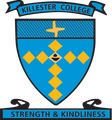Wellbeing

Exam Stress - Special Report
With exams for Year 10 and 11 students about to begin next week, students can often experience increased stress and anxiety. Sleep deprivation, diet and social media are some of the biggest issues faced by this group of teens. Therefore it is vitally important that a student's mental health is looked after as well as their physical health.
Keeping things in perspective for students and parents alike can help prevent everyone getting overwhelmed. Although the exam experience is important, it is not necessarily the most important factor in their learning experience.
There are many strategies that students can implement to help themselves. Parents can provide support, not only emotionally, but also practically by keeping their child well nourished and encouraging physical activity.
In this special report, parents will find useful tips to support their child during this often stressful time for them. We hope you take time to reflect on the information offered here and we always welcome your feedback.
If you do have any concerns about your daughter, please contact her Homeroom Teacher or Student Development Co coordinator. Good Luck to our students during this upcoming exam period.
Luana Doko
Student wellbeing Leader
Here is the link to your special report
https://killester.vic.schooltv.me/wellbeing_news/year-12-exam-stress-special-report. Although this report focuses on Year 12 exams it s useful for all students who are doing exams. Year 10 and 11 students can certainly benefit from this advice.
Andrew Fuller – Psychologist also offers some helpful insights to focus on for students and parents.
This is the time of the year when motivation often slumps. At this time we look around for that magic ingredient - ‘MOTIVATION’. If only it came in a bottle or in a tablet or in the form of a suitably inspiring pep talk. We need to treat the cause of loss of motivation. Loss of motivation stems from a loss of belief in yourself, that you can be successful. What causes that loss of self-belief is anxiety. One way to manage anxiety is to avoid. Avoidance looks a lot like putting your head in the sand, playing computer games endlessly, languishing on the couch, continuingly checking social media messages, yawning and looking bored. Of course, it is not always so calm. Avoidance can be interspersed with times of high drama when young people argue, rant, rave and panic. We have two tasks to re-ignite motivation:
- Help young people to believe in themselves again; and
- Reduce avoidance and anxiety.
Re-igniting Self-Belief
Ok you’ve delivered the pep talk, threatened to restrict all their privileges, pleaded with them, cajoled them, told them they can leave school if they wish and earn a measly pay rate working long, hard hours and they are still looking listless. They are not listening to you. What do you do?
Lower anxiety
Anxiety is like an infectious disease passed from one student to the next. Teenagers often give their friend’s opinions much more prominence than their parent’s advice. Trying to soothe, calm and re-inspire them with your words is like whispering a message while facing into a cyclonic gale.
Get up, stand up
Anxiety is exhausting. However, sitting or lolling about festering over your fears doesn’t help. If you can budge them, get them up and moving. Walking with them. Play sport. Even taking them for a drive is better than nothing. Mindfulness activities and relaxation tapes may also be powerful but when students become really anxious, being active is the best place to begin. When we are stressed our body is geared up for action and unless we do something to rid ourselves of the built up stress hormones they stick around and de-motivate us.
Rev up
Dopamine is the neurochemical most powerfully associated with motivation. Dopamine is increased when we engage in rhythmical movements. Activities like basketball, dancing, hula-hoops, down ball or four-square, drumming, skateboarding, surfing and playing tennis all increase dopamine.
Goals are good, systems are better
It is great to have a goal to do well but if you have no system to achieve that outcome you are unlikely to get anywhere close to where you want to be. If you have developed a system earlier in the year, discuss returning to it. If it needs revising and updating, help them to do that. If they have been completing studies without any system at all now is a good time to introduce one.
Imagine forwards, plan backwards
The best systems involve imagining forwards and planning backwards. You can apply this to almost every aspect of life. Start by imagining forwards. What do you want to have happen in your future and when do you want it to happen by? Just specifying your answer to that question increases the likelihood you will end up somewhere close to where you want to be. Then plan backwards. What are the steps involved in creating that outcome. Writing down small steps on post-it notes and arranging them into a logical order helps.
The Online World
There are so many wonderful aspects of the online world for our students – staying connected with friends and family, sharing experiences and interests and of course opening up new opportunities to support and enhance learning. It’s a challenge for our girls and families to balance these aspects with the possible negative aspects that can place our young girls at risk – emotionally and physically, affecting their overall wellbeing.
At Killester we spend time speaking to students at every year level about sensible and safe use of their digital devices and the Internet. We often find that Internet access and use at home can create circumstances where students place themselves at risk.
Schools have been alerted to a new game played online which involves challenging young people to self-harm. Obviously this is incredibly unhealthy and potentially very dangerous. Australian Police have put out a warning regarding the game should you wish to know more, the language could be alarmist so please be mindful of this,
https://www.itwifi.com.au/warning-parents-blue-whale-suicide-game-spreading-around-globe/
Our reasoning for drawing your attention to this is that there have been some cases in Casey related to self-harm that may be in response to this game, should you hear any discussion regarding this by your daughter and their friends please contact the school via your daughter’s Homeroom Teacher or Student Development Leader.
Earlier this year we had Susan McLean from Cyber safety Solutions speak to parents. Below you will find some additional advice and websites for resources. Please do not hesitate to contact the school for support if you are concerned about your daughter’s Internet and social media use.
Luana Doko
Student Wellbeing Leader
On-line Safety Advice for Parents
How can I minimise the risks for my child?
- Make sure that your children understand that they will not get in trouble if they tell you about a problem.
- Be proactive to learn about the internet with your child – get your daughter to share their knowledge of the internet in a fun environment.
- Spend time online with your daughter, just as you would with many other activities such as sport, board games and walking the dog – learn and explore together.
- Install filters and other monitoring/blocking software to minimise dangers. This is already done in at Killester. Have up to date filtering software installed at home.
- Know the sites they are accessing to ensure suitability. Filters CAN sometimes fail to protect and can be bypassed by a ‘tech savvy’ child.
- Talk early, talk often – have an age appropriate conversation with your daughter about the information they share, the groups they join and the social media they use.
- Promote self confidence and that it is OK to say “no” – let them know that they don’t have to give in to peer pressure or send intimate images just because others do.
- Teach them about consent and respectful relationships – help them to understand the impact of sharing intimate images of others and that they are breaking someone’s trust when they do this.
- Talk about the risks – what can go wrong and the legal issues. Remind them that whatever they say or put on-line can have a lasting effect on them and others.
What can I do when things go wrong?
- Stay calm and open – reassure them that they are not alone and that you will work through their concerns together.
- Listen, and act fast – there are a number of ways to do this. Get help and support – look after your daughter’s wellbeing and encourage them to request counselling and support advice. Student Development Leaders and the College Student Services Team can guide you.
After school hours support is available for students and parents kidshelpline.com.au or 1800 55 1800
provides free and confidential online and phone counselling to young people aged 5-25. It is available 24 hours a day, 7 days a week. eheadspace.org.au or 188 650 890 provides free online and telephone support and counselling to young people 12 – 25 and their families. It is available 9-11am, 7 days per week.
Support for parents - Parentline 13 22 89 – offering counselling, information and a referral service:
- Talk about any issues to do with parenting and your relationships with your child
- Help you with ways to cope and be a positive parent
- Help with your family's wellbeing and resilience
- Connect you with services in your area.
- https://www.education.vic.gov.au/parents/services-for-parents/Pages/parentline.aspx
